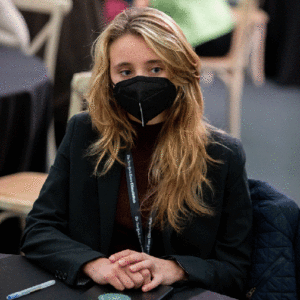Using our power as consumers
Today’s talks at The New York Times Climate Hub included notable panelists such as Stella McCartney speaking on the importance of sustainable fashion and animal rights and Matt Damon, who co-founded water.org, a nonprofit organization that aims to increase access to water and sanitation around the world.
I found these two sessions the most intriguing, as water and clothing are part of our everyday lives, and the majority of Lafayette students do not think about the supply chain behind their T-shirt or come from backgrounds where they need to think about where their next glass of water is coming from.
First, I want to discuss the issue of water accessibility as explored in Washing Up: Ensuring Universal Access to Water, Sanitation and Hygiene. For one billion people, the water we have in our taps and toilets in Easton is cleaner than what they have access to. Joining Matt Damon in discussing this was water.org’s co-founder, Gary White, and Rose Wamalwa, who grew up in rural Kenya and spent her childhood having to walk long distances to get water for her family after school. This background is not a common one to find in Easton, and no one on campus worries about where their water comes from, while on the other side of the planet some of the poorest people are paying the most for water.
The water crisis is real, and not only are women the most affected by this, but as Wamalwa shared, they have the potential to address most of the issues on the ground. And for those in positions of privilege and accessibility–many Lafayette students–the best form of action we can take is to donate money to organizations working with these communities to jumpstart work on the ground and give a platform to women like Wamalwa to share their stories and help by listening to them when they are given the microphone.
Stella McCartney also touched on accessibility in relation to sustainable clothing in a sector that is historically not sustainable and often overlooked by activists and politicians. The talk was entitled Circularity, Scale and Style: When Will We Reach Critical Mass?. McCartney is a fashion designer and founder of Stella McCartney, one of the first brands measuring environmental profit and loss and actively researching alternatives to furs and leather for the sake of animal rights, which McCartney noted are largely left out of the COP26 negotiations.
In addition to a call for market incentives such as tax breaks for producing sustainable items, McCartney shared that “when it comes to fashion consumers have all the power.” When we buy into fast fashion and buy unnecessary amounts of cheap clothes, we are also buying into unsustainable practices, inhumane treatment of factory employees and animals.
This is something we can fight on campus in a few ways, such as saving up and buying fewer, higher-quality items that will last years longer than a cheap shirt that will degrade after a few washes. We also can hand down clothes and buy vintage, an initiative run by the Office of Sustainability at Lafayette that gives students the opportunity to donate clothes they no longer want and pick up new ones in a clothing swap.
My main takeaway from today’s talks is to use the position we have on an affluent campus in Pennsylvania to enact positive change for those who are most adversely feeling the effects of climate change by donating, listening to those often not given a platform, and making environmentally conscious decisions in our purchases to create enact long-term change from the ground up. We need to use our power as consumers.
Screenshot at top courtesy of The New York Times.
